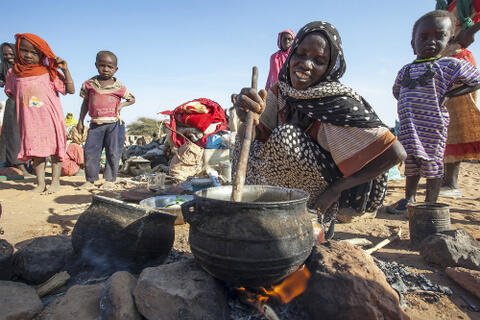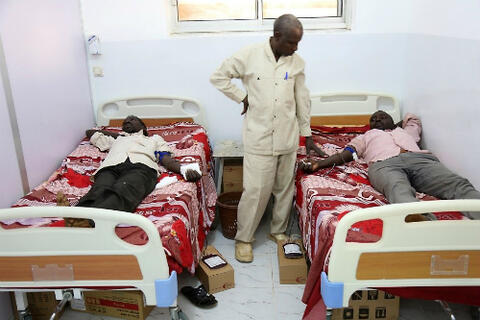NORTH DARFUR, Sudan – Last year, when Zahar Ali went into labour with her first child, her family brought her to El Fasher Maternity Hospital, North Darfur’s largest health facility offering maternity services. After examining Zahar, her doctor ordered a Caesarean section. However, before the procedure could be performed, she had to wait for over an hour for the blood needed for a transfusion to arrive.
“I was very scared,” says Zahar.
Like many health workers in Darfur, which has been plagued by conflict since 2003, El Fasher Maternity’s staff must contend with frequent losses of electricity, outdated laboratory equipment and floors so cracked they sometimes introduce infection into otherwise sanitized spaces.
In addition, the facility’s blood bank had long consisted of just one refrigerator too small to hold a sufficient supply of blood – and the limited number of bags it could fit were constantly threatened by the intermittent electricity. The bank also lacked the equipment necessary to test donated blood for its type or for HIV, hepatitis B and C and other infections.
As a result, the staff often had to import safe blood from the El Fasher Teaching Hospital, forcing them to delay emergency procedures, such as Caesarean sections or treating post-partum haemorrhages, as the blood was transported and prepared.

But last fall, through support from UNFPA, the Ministry of Health, the Central Emergency Response Fund (CERF) and other partners, El Fasher Maternity renovated their blood bank, and it is now complete with blood testing equipment, a larger refrigerator, air conditioning units and a generator to prevent electricity interruptions.
Shortly after the renovation, Zahar Ali returned to give birth to her second child, again through Caesarean section. “This year, the blood was ready, and I felt safe, and now me and my child are in good health,” she says, happily.
Safe birth amidst long-term instability
According to UN estimates, since 2003, the conflict in Darfur has caused approximately 300,000 casualties (many of them civilian) and the displacement of nearly 3 million people. In January, an eruption of violence in the region's Jebel Marra area displaced over 100,000 individuals, more than 85,000 of whom have since fled to camps and emergency settlements in North Darfur.
The decade-plus of fighting has also resulted in chronic staff and funding shortages at health facilities throughout Darfur and in a maternal mortality ratio that is more than double the already high national ratio in the Sudan of 311 per 100,000. Globally, the unstable conditions found in crisis and other fragile and humanitarian settings result in 60 per cent of annual maternal deaths.
An average of 569 women seeking obstetric care visited El Fasher Maternity each month in 2015, and the recent influx of displaced patients is further straining the facility’s already taxed capacity.
Improving maternity care in Darfur

Like Zahar, many of these new patients may experience complications that require a blood transfusion, and the increasing demand will require an increasing supply of clean blood.
In addition to supporting the blood bank renovation, UNFPA is also conducting a campaign to raise awareness among the citizens of North Darfur about the critical role blood donations play in saving lives. This effort, combined with the fact that the hospital can now offer donors clean beds in a cool, air-conditioned room, has caused donations to steadily rise.
In response to the ongoing conflict, UNFPA is also providing reproductive health kits and other reproductive health services throughout Sudan, reaching over 60,000 women and girls in 2015 alone, and is working to reduce the national shortage of maternal health professionals by training midwives at schools and health facilities around the country.
And despite the many ongoing challenges, the staff at El Fasher Maternity now knows that they have enough blood on site to ensure their growing flow of patients can quickly receive clean transfusions during critical, even life-threatening procedures. “The rehabilitation of the blood bank has made a big difference,” says Ibrahim Ismael, the hospital’s blood bank technician. “It makes the job of responding well to urgent obstetric cases much easier.”


